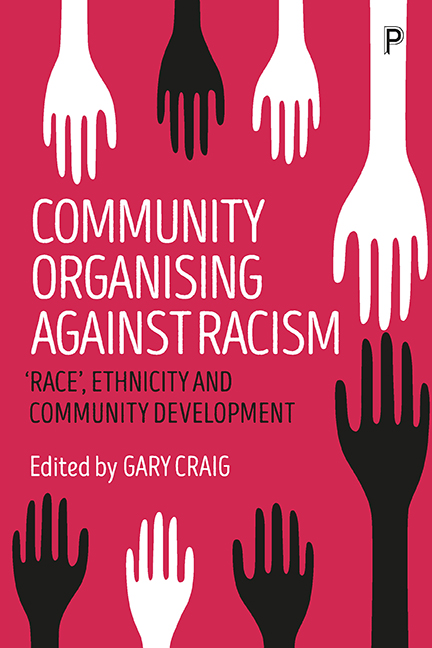Book contents
- Frontmatter
- Dedication
- Contents
- List of figures
- Author biographies
- List of abbreviations
- Introduction
- Section One Community development with ethnic minorities: history, theory, policy
- Section Two Building capacity with BME groups
- Section Three Working with Roma communities
- Section Four Global experience
- Section Five Working across cultural boundaries: ideological and personal reflections
- Afterword: Messages for community development in working with minority groups
- Index
six - Community development with Chinese mental health service users in the UK
Published online by Cambridge University Press: 12 April 2022
- Frontmatter
- Dedication
- Contents
- List of figures
- Author biographies
- List of abbreviations
- Introduction
- Section One Community development with ethnic minorities: history, theory, policy
- Section Two Building capacity with BME groups
- Section Three Working with Roma communities
- Section Four Global experience
- Section Five Working across cultural boundaries: ideological and personal reflections
- Afterword: Messages for community development in working with minority groups
- Index
Summary
Introduction
The aim of community development is to change social conditions so that people can develop their capabilities and flourish. In mental health, tackling social determinants that contribute to (mental) ill-health is now an agenda of the World Health Organisation. For ethnic minorities, evidence has shown that (mental) health has been closely linked to social and economic inequalities (Nazroo, 2014). Based on my research, this chapter focuses on Chinese mental health service users in the UK and aims to illustrate how structural inequalities shape their recovery journeys. It starts with a discussion of the Recovery Approach with which the research critically engaged. Then, the diversity within the Chinese community in the UK will be introduced. Two stories from the research were selected to shed light on how, for UK Chinese people, inequalities such as class, gender and ethnicity intersect at national and transnational levels and impact on the way recovery journeys unfold. Such inequalities contribute to their distress and ill-health in the first place and could hinder their recovery. The implications for community development work with Chinese communities will then be discussed.
Mental health recovery
The Recovery Approach is being mainstreamed in mental health policies in countries such as the UK. Against a prognosis of pessimistic chronicity, or an emphasis on cure and complete removal of symptoms of illness, advocates of the Recovery Approach argue that recovery should be considered as a way of living a meaningful life with or without the limitations caused by distress and mental ill-health (Anthony, 1993). Recovery is both personal and social. It is personal in its assertion of the rights of mental health service users to control their own lives, and in an understanding that recovery is a personal process unique to each individual, with self-defined routes and goals (Deegan, 1998). It is social in that its emphasis is to ensure that service users have equal opportunities and that their ability to live fully as part of a community is not compromised (Davidson and Roe, 2007).
Yet, there are criticisms of the way recovery and social inclusion discourses are being mainstreamed in government policies across the world.
- Type
- Chapter
- Information
- Community Organising against Racism'Race', Ethnicity and Community Development, pp. 109 - 122Publisher: Bristol University PressPrint publication year: 2017



